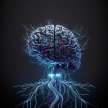
Now, we humans are finding themselves of a remarkable transformation—one that blurs the boundaries between the living and the dead. This story commenced in 2020 when a Korean documentary crew joined forces with VR producers on a unique mission: to help overcome the grief of a mother craving to reunite with her departed daughter. Although some people had arguments and discussions about this project, it actually led to something amazing: the idea of not just saving memories but also keeping a part of who a person was.
Many questioned the ethical, moral, and even metaphysical implications of such a venture. Could technology, genuinely bridge the gap between the world of the living and that of the dead? Would this be a form of mere illusion? The answers to these questions were far from clear.
However, as the documentary unfolded, the world witnessed a remarkable transformation in the grieving mother. Her journey through the realms of virtual reality and artificial intelligence allowed her to reconnect with her daughter, if only in a digital form. The emotional relief she experienced was remarkable and emerged from the experience with newfound peace. This story of the grieving mother who found comfort in this technology is like a big stamp of approval. It shows that this new field has the potential to help people feel better when they're going through tough times, like when they're really sad about losing someone they love.
More recently, a South Korean company named Deep Brain AI has taken the concept of preserving minds and memories to astonishing new heights with its revolutionary "Re-Memory" platform. This platform employs advanced AI algorithms to enable individuals to reconnect with their departed loved ones in a manner that feels eerily lifelike. The process involves creating highly detailed 3D representations of the deceased, which, while costly at approximately $10,000, can serve as a profound source of solace for those yearning for one last conversation.
The Re-Memory platform further offers hour-long video calls, providing an avenue for communication with the departed. Although these conversations need to be programmed in advance, the tantalizing prospect of future advancements promises real-time interactions with AI avatars. This would enable spontaneous, meaningful dialogues with the deceased, further bridging the gap between the living and the departed.
Imagine a world where technology grants us the privilege of conversing with historical intelligent beings such as Albert Einstein and Nikola Tesla. The potential for preserving their wisdom, knowledge, and unique characteristics through AI systems is awe-inspiring. It could lead the way in a new dimension of human evolution, allowing us to tap into the collective wisdom of the ages, learning from the great minds of the past, and potentially even seeking their guidance on today's challenges.
The implications of collecting and preserving data from individual lives extend far beyond mere communication with the dead. This repository of knowledge and experiences could serve as a valuable resource for future generations, facilitating advancements in various fields of study. It could provide insights into historical events, scientific discoveries, artistic creations, and the very essence of the human experience.
However, this expanding field also raises ethical, legal, and philosophical questions that demand careful consideration. How do we safeguard the privacy of individuals, even in death? What are the implications for our sense of closure and acceptance of mortality? As we tread into uncharted territory, it is essential to strike a delicate balance between technological progress and ethical boundaries.
The journey to preserve minds, thoughts, ideas, and dreams, alongside the evolution of technology, holds immense promise. It has the power to offer peace to those in grief, provide access to the wisdom of the ages, and advance our understanding of the human experience. We're at the edge of something amazing called a "digital afterlife." It's like a new way of remembering and talking to people who have passed away using computers. How we use this technology will change how we remember and respect the people who are no longer with us in the future.
About the Creator
tech hub
Your guide in exploring wonders of artificial intelligence, futuristic innovations and the latest tech trends. Join me in unraveling tomorrow's mysteries of AI.
Instagram : @techiehub01
Medium_digest : @Techiehub
Quora : Tech Hub






Comments
tech hub is not accepting comments at the moment
Want to show your support? Send them a one-off tip.